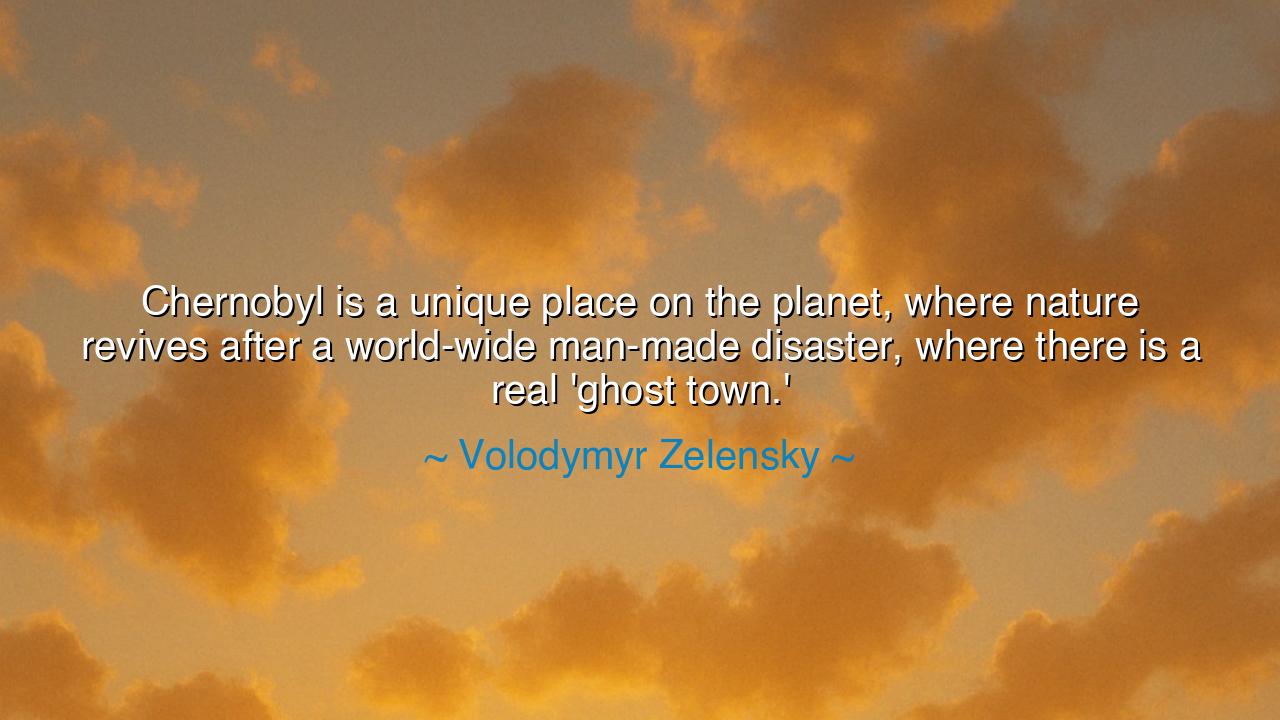
Chernobyl is a unique place on the planet, where nature revives
Chernobyl is a unique place on the planet, where nature revives after a world-wide man-made disaster, where there is a real 'ghost town.'






The words of Volodymyr Zelensky speak of Chernobyl, a place both cursed and sacred. He calls it a unique place on the planet, for there the earth still bears the scars of a man-made disaster, yet life itself, untamed, rises again. He names it a ghost town, a reminder of human folly, yet at the same time, he witnesses the power of nature to revive, even when humanity retreats. This duality—ruin and rebirth—makes Chernobyl not only a site of tragedy but also a silent temple of wisdom for all generations to behold.
The origin of these words reaches back to 1986, when the explosion at Reactor 4 cast a shadow across nations. Families fled, homes were abandoned, and entire cities were left in silence. What once was a land of industry became a graveyard of dreams. Yet, as the decades passed, the wild forests crept back, the wolves and deer returned, the rivers whispered again, and the trees wrapped themselves around broken buildings. Thus, Zelensky points to a paradox: where man’s hand wrought destruction, life itself refused to die.
This tale is not unlike that of the ancient city of Pompeii, buried by the fire of Vesuvius. The ashes destroyed, yet preserved; they silenced human voices, yet gave future generations a window into the past. Or consider the fields of Hiroshima, once blackened by flame, now green with gardens, where children laugh beneath skies that once bore the mushroom cloud. These places remind us that while human ambition and error can bring ruin, the resilience of life endures beyond despair.
The image of a ghost town carries deep weight. For in its empty streets, one hears the echoes of laughter, of footsteps, of lives once lived. It is as if the past lingers, unseen but not forgotten. Ghost towns are not merely empty—they are teachers. They remind us that progress without wisdom becomes decay, and that what is abandoned can become a monument, a warning, and a prayer all at once.
Zelensky’s words are also heroic in tone, for he does not look upon Chernobyl with only sorrow. He sees in it a lesson of revival—that the earth itself has a will to heal, even when man falters. This is a truth the ancients understood well: rivers reclaim their course, forests return after fire, the sun rises though kingdoms fall. The strength of nature is not only in beauty but in endurance, and from that endurance, humankind must learn humility.
The lesson here is for all who walk this earth: guard the world entrusted to you. Do not treat it as an endless well to drain, for disasters such as Chernobyl reveal the cost of arrogance. Yet also, do not despair when destruction comes, for there is always the seed of renewal. Just as the forests reclaimed the ruins, so too can human lives rebuild after loss, if only they have the courage to begin again.
Practically, let us live with responsibility. Honor the balance of nature; do not repeat the recklessness that scars the earth. Visit the ghost towns not with curiosity alone, but with reverence, seeing them as mirrors of what we may become if wisdom is abandoned. And when you witness renewal—whether in a flower breaking through concrete or in a people rising after hardship—remember that resilience is the law of life.
Thus, when Zelensky declares Chernobyl a unique place, he is calling upon us to see both sides: the warning and the wonder. It is a shrine to memory, and also to resilience. Carry this teaching with you, O listener, and let it guide your steps, that your works may bring not devastation, but flourishing, so that the ghost towns of tomorrow may remain only as stories, not as destinies.






AAdministratorAdministrator
Welcome, honored guests. Please leave a comment, we will respond soon